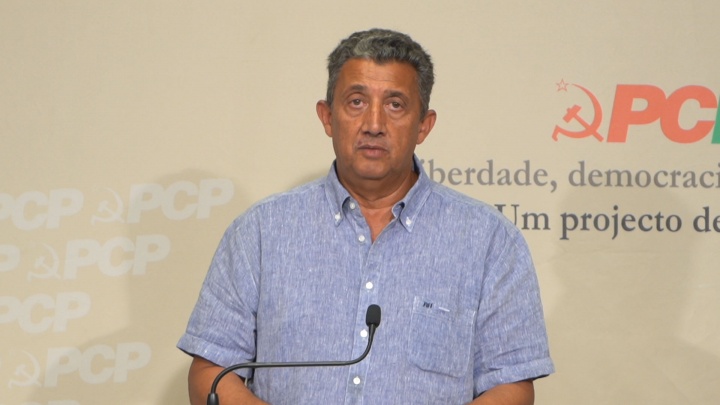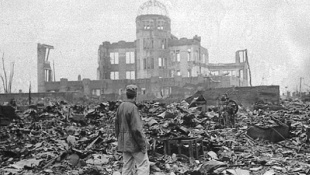1.The PCP considers it important to signal two occasions, which, although of opposite sense, hold teachings of great importance for the development of the struggle today for a world of peace and friendship among all peoples, free from interference and wars of aggression by imperialism and threat of nuclear holocaust.
2.It was on August 6, 1945 when the US, committing one of the most heinous crimes recorded by history, dropped the atomic bomb on the Japanese city of Hiroshima (a crime that they repeated three days later in Nagasaki) causing thousands of innocent victims, killed and maimed due to the terrible effects of atomic radiation. An indescribable crime that was and continues to be justified and trivialised with the lie that it was necessary for the defeat of Japanese militarism, but which in fact constituted a perverse experiment of the destructive effects of that new weapon and the affirmation by US imperialism of its project of world domination.
Since then, the arms race and the production of increasingly powerful and sophisticated nuclear weapons has never ceased, having forced the Soviet Union and the socialist camp to make great efforts to achieve a strategic military balance that, facing aggressive US and NATO policy, was instrumental in ensuring world peace. But while imperialism constantly menaced with the nuclear threat, as in the Korean War, the forces of social progress and peace fought permanently for disarmament and for the abolition of nuclear weapons. The Portuguese revolution of 25th. April included in the Constitution of the Portuguese Republic (Art.7) “the abolition of imperialism, colonialism and any other form of aggression, domination and exploitation in the relations between peoples, as well as the general, simultaneous and controlled disarmament, the dissolution of political-military blocs and the establishment of a system of collective security, with a view to creating an international order capable of ensuring peace and justice in relations between peoples”.
3.Resulting from the persistent struggle by the forces of peace, the Conference for Security and Cooperation in Europe was held on August 1,1975 in Helsinki, the capital of neutral Finland, in which all the capitalist countries of Western Europe and the socialist countries of Eastern Europe participated, together with the US and Canada. The new democratic Portugal was represented by the President of the Republic, Marshal Costa Gomes. The “Helsinki Final Act” then approved represented a historic step on the path of detente, disarmament and cooperation between countries with different social systems. However, under the most diverse pretexts the US and other capitalist powers, persisting in their policy of “containment of communism”, did everything to stall and sabotage the agreements reached, in a context in which from Nicaragua to Afghanistan, from Angola to Ethiopia and Yemen important revolutionary processes were taking place which called into question the hegemonic aims of imperialism. The policy of peace and internationalist solidarity of the Soviet Union and of the socialist countries, together with the growth throughout Europe of powerful movements fighting for peace, was fundamental for the success of Helsinki. The tragic defeats of socialism that subsequently took place must not overlook the importance and historical significance of the Helsinki Conference whose 45th. anniversary the PCP considers necessary and timely to signal.
4.75 years after the Victory over Nazi-fascism, the international situation is fraught with great dangers for world peace and security. Faced with the deepening of the structural crisis of capitalism and the decline of its relative influence worldwide, the United States is engaged in a violent exploitative and aggressive offensive involving wars of aggression, brutal economic blockades and inhuman sanctions against sovereign countries, a new spiral in the arms race and an authentic and very dangerous "crusade" against China into which they seek to drag its allies. The expansion of NATO’s field of intervention, the multiplication of military bases around the world, the breach of important international agreements by the American administration starting with the nuclear weapons limitation agreements, together with the admission of a “preventive use” of the nuclear weapon, are events that cause great concern and that demand from the forces of social progress and peace around the world the most vigorous condemnation and the development of the struggle to turn back irresponsible aims that are not only causing great suffering to the people of many countries in the world, but could drag the world into a conflict of immeasurable proportions.
In view of this situation, the PCP considers it necessary not to let fall into oblivion, nor to falsify the significance of historical events that hold important teachings for the present. Considers it is its duty to combat historical revisionism that not only seeks to erase the decisive role of the communists and of the socialist countries in the great progressive transformations of the 20th. century, as well as to whitewash, justify and trivialise the great injustices and crimes born in the bowels of capitalism as in the case of Hiroshima and Nagasaki. Considers it timely to stress the deep conviction that, as history abundantly proves and the Helsinki Conference illustrates, it is possible, through the struggle of the popular masses, of the forces and movements of peace, and of the progressive and socialist countries, to reach agreements guided towards disarmament, cooperation and peace.
The PCP condemns Portugal's policy of subservience to imperialism carried out by successive governments, a policy that not only silences and colludes with the illegalities and aggressions by imperialism, but has sometimes been at the forefront of imperialism's strategy of hegemony, as was the case of the aggression against Iraq or operations to overthrow Venezuela's legitimate government. Compliance with Article 7 of the Constitution explicitly obliges Portugal to engage in the struggle in defence of the UN Charter, for disarmament, for respect for the sovereignty of States, against imperialism and neo-colonialism.
The PCP considers that respect for the letter and spirit of the Constitution of the Portuguese Republic in matters of foreign policy and national defence, is a fundamental component of the patriotic and left-wing alternative that it advocates for the country.



